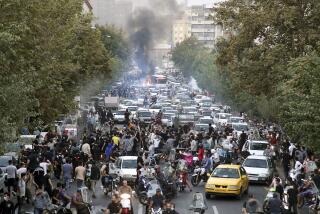Iraqis in Kufa bemoan Sadr movement’s diminished role
- Share via
KUFA, IRAQ — After voting, the young men stand cursing those they consider the hypocrites -- plundering Iraq’s wealth; campaigning for office with tousled hair, 5 o’clock shadows and knockoff Italian suits.
They remember the days when Shiite Muslim cleric Muqtada Sadr’s Mahdi Army militia made people tremble, when it wasn’t relegated to the shadows.
In ratty, grease-stained sweatsuits, they survey the run-down industrial buildings of Kufa, grass growing out of the concrete, and they jealously view neighboring Najaf, home of Iraq’s elite Shiite clergy, with its flow of religious tourism, its packed bazaar and the golden dome of the Imam Ali shrine.
In Kufa, burned trash lies in the street. Metal girders poke out from an unfinished soot-stained building. Voters stream by, groups of women in dark head-to-toe gowns, and men in traditional brown robes, emblematic of the town’s conservative culture.
Sadr’s movement still enjoys some popularity here, where the young preacher once delivered his sermons that challenged the Americans. His lieutenants still deliver his sermons from the Kufa mosque. But it’s not the same.
As crowds walk by, a policeman in a dark beret keeps his eyes fixed on the pack of young men. Haidar Lafta shows his index finger, stained a deep purple after he voted for the Independent Movement of the Free People list, one of the two Sadr-sponsored slates in the election. The movement’s poster displays a pair of fists tearing apart a rope binding them.
His friends applaud as Lafta curses the ruling Shiite powers, the ones they believe conspired against Sadr’s militia with a military offensive in Basra last spring. After that campaign, the Sadr movement went from a powerful force that many suspected would sweep elections in the Shiite south to one in disarray.
Lafta shakes his fist when he talks about Sadr’s movement. “They are strong. They know how to talk, to defend the oppressed people,” he says.
He disparages Prime Minister Nouri Maliki, who ordered the Basra campaign and reaped benefits afterward: “He has done nothing for Kufa.”
The men reminisce about the sights of full-blown war in the spring and summer of 2004, when the Mahdi Army was at the height of its power, fighting U.S. Army tanks and helicopters with young men equipped only with rocket-propelled grenades, rifles and crude bombs. They mention the names of some of their dead.
But other matters are more pressing than the past. “We want the government to help the young people,” Lafta says. He is tired of wasting his days loitering in alleys.
--
More to Read
Sign up for Essential California
The most important California stories and recommendations in your inbox every morning.
You may occasionally receive promotional content from the Los Angeles Times.













